From addiction to advocate: RI's mission to help pregnant mothers battling with substance use
Katie Merchant Gonzalez has two phones on her at all times, ready to take calls day or night. She knows that many of the callers on the other end are fragile and struggling – pregnant women or new moms wrestling with substance-use disorders.
She also knows just how narrow the window is to get them the help they and their babies need. So when someone calls, Katie picks up.
“If somebody says they’re ready for treatment, you have a very small opportunity. Being available at that moment is the most important thing,” Gonzalez said.
Gonzalez, 41, knows from experience. She was addicted to opioids for years and found herself living on the streets of Providence, squatting in drug houses or “abandominiums,” she quips, until she finally had enough.
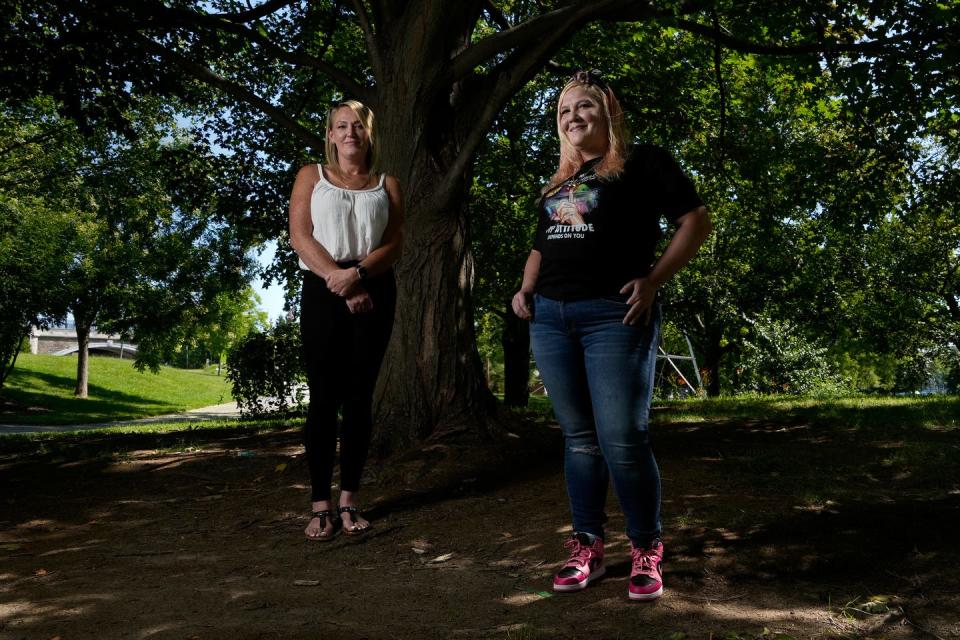
“I remember winters where it was colder inside than it was out,” she said. She was dope sick on Christmas Day and she missed her son.
Today, Gonzalez, who just celebrated eight years in recovery, is an essential piece of the state’s strategy to help pregnant women who are using drugs or have a history of substance use, locating them and enveloping them in services and support with the objective of keeping mothers with their newborn babies as long as it’s safe and they do the work.
“One of our goals in the state is to identify moms and get them into care and onto medication so they can get into prenatal care,” said Dr. Mara G. Coyle, a neonatal specialist at Women & Infants Hospital in Providence. “The last thing we want to do is separate mom from her baby, because that’s saying you’re not good enough.”
"Protecting the mother-child dyad needs to start early," said Margo Katz, who manages the state Department of Health’s public health program for substance-exposed newborns.
Infants born with 'neonatal abstinence syndrome' doubled in a decade
The strategy marks a change from the state’s previous approach, which involved alerting state child welfare authorities about pregnant mothers who were using and placing a note in their file, with someone prepared to remove the baby at birth. If there wasn’t a baby, there was no role for the state, the thinking went.
The state’s philosophy evolved during the opioid crisis with the recognition that babies were being born at increasing rates with neonatal abstinence syndrome, which can cause the newborn to go through withdrawal if the mom was using drugs or medication to ease narcotics cravings and withdrawal symptoms during pregnancy.
The number of infants born with the syndrome more than doubled, from 44 in 10,000 births in 2015 to 95 in 10,000 within a decade.
With that in mind, in 2019, the state started doing outreach to families in partnership with peer-recovery specialists with lived experience, like Gonzalez, according to Stephanie Terry, the director of child protective services at the state Department of Children, Youth and Families.
“A critical piece of this is the alert,” Terry said.
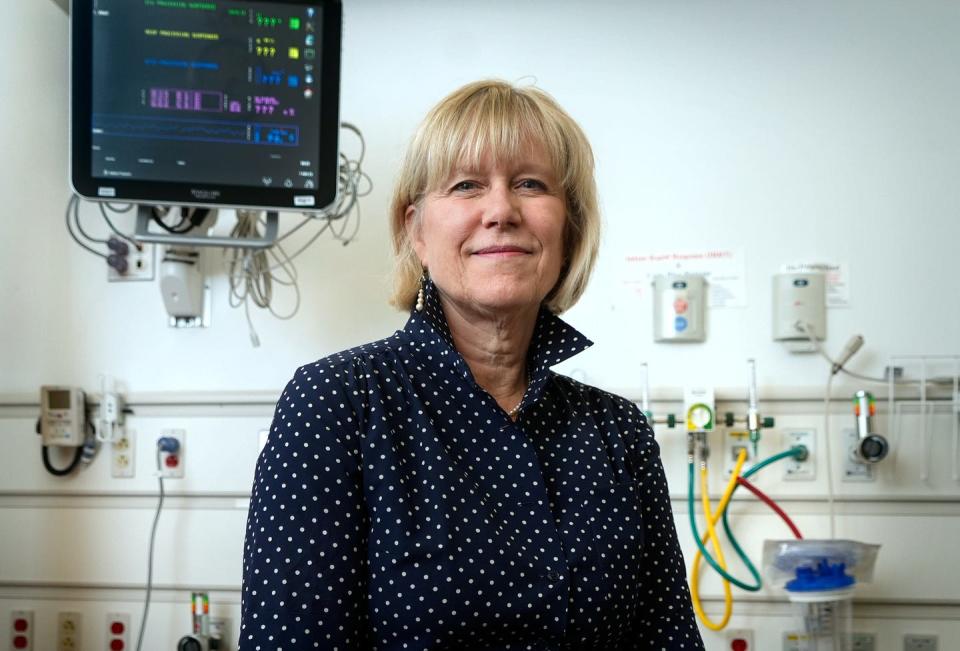
They are spreading the word to emergency rooms, health care providers, social workers and methadone clinics to refer patients who are pregnant and using, or managing their recovery with medication, so they can be connected with support.
“I say, 'If you’re interested, we have services. We can help.’ Of all the calls I’ve made, no one has said no,” Terry said.
“We’re not being judgmental. We really want to keep children in your homes," Terry said. "When we remove a child, they lose hope. They spiral.”
In recent years, the number of children born with neonatal abstinence syndrome has gone down, with 76 in 2021 and 61 last year, according to the state Department of Health.
‘Don’t hang up. We’re offering you help.’
Peter Slom recalled making the first call at Terry’s urging years ago, after the state received an alert.
“The philosophy had been that women who do drugs are bad people. They weren’t,” said Slom, who traveled his own recovery journey after landing in prison in his 30s.
Terry instructed him to tell the woman not to hang up and to explain that they could connect her with services and a peer-recovery coach to help increase the chances she could stay with the baby.
"'This is Peter Slom from DCYF. Don’t hang up. We’re offering you help. We won’t take the baby as long as you’re doing well,’” recounted Slom, who spent three years as the substance-use disorder liaison at DCYF until his retirement. He now consults with the Parent Support Network of Rhode Island.
That first woman said yes, putting in motion a novel collaboration between Slom, Gonzalez, Terry and others at the Parent Support Network of Rhode Island and the Department of Health to help mothers and families remain intact.
Gonzalez estimates that they’ve assisted about 500 families to date.
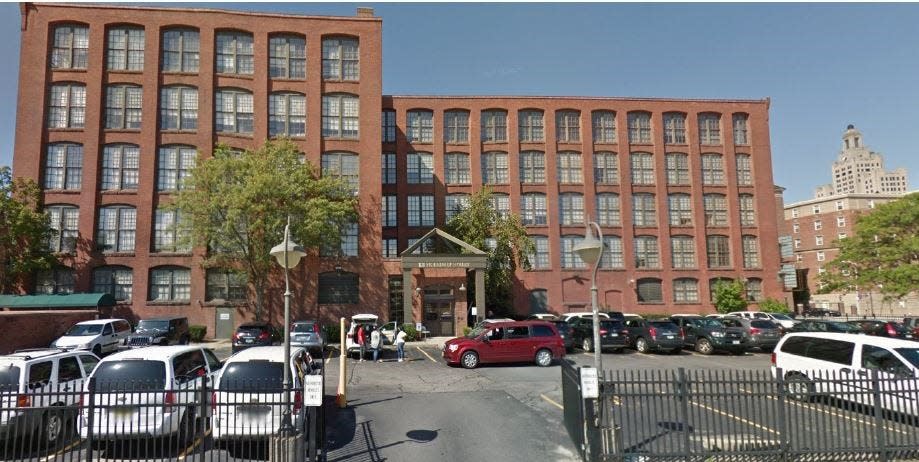
Medication-assisted addiction treatment as the 'gold standard'
In Rhode Island, in contrast to Massachusetts and other states, if an expectant mother is managing her recovery with methadone or buprenorphine, it is not considered a safety concern, according to Katz.
“Medication-assisted treatment is considered the gold standard,” Katz said. “It stabilizes the mom and it stabilizes the fetus. It can be far worse if mom is using.”
Coyle, of Women & Infants Hospital, rejects as infuriating the notion that opioid addiction is a self-inflicted disease. It should be treated with the same care and attention as diabetes or heart disease, she believes.
“When I meet with patients, the first thing I tell them is congratulations, and congratulations for being in treatment,” said Coyle. “Getting to an appointment can be a big deal.”
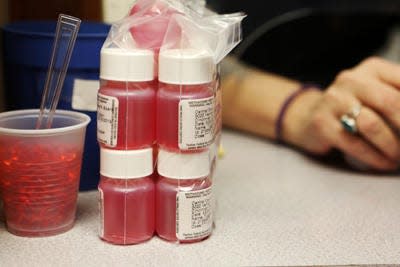
Women & Infants Hospital creates a Family Care Unit
Women & Infants Hospital created a dedicated Family Care Unit in 2016 to assist mothers on medication-assisted treatment and their newborns.
“From a health care standpoint, that was a game changer in Rhode Island,” said Katz, of the state Department of Health.
Katz said the unit is staffed with compassionate professionals who take a holistic approach to mother and child. As a result, it has seen a reduction in the number of infants who needed treatment in the neonatal intensive care unit.
The unit allows mothers to stay in the same room with their newborn, even if they technically have been discharged themselves, to play the crucial role in comforting and bonding with the baby if the child is experiencing withdrawal, when the infants’ behavior can be marked by irritability, tremors, difficulty eating, rigidity and fussiness. Data shows that the bonding contact with the mother, cuddling skin to skin, massage and breastfeeding lessens the severity of the symptoms.
More: 'People are going to start losing limbs': Animal 'tranq' is reshaping RI's drug landscape
“We now know the main focus is to care for them. Who better to do that than the family?” Coyle said. “We’ve come to learn that non-pharmacological intervention is the best way.”
The babies are scored using the Finnegan Neonatal Abstinence Scoring System, based on the intensity of their symptoms, to determine if they should receive pharmacologic therapy such as methadone. An occupational therapist and social worker works with the family and nurses and doctors to assess the infants daily. Eventually, they are weaned off any medication.
On a recent morning, the nursery lights were dimmed to lessen external stimulation for an infant struggling with heightened sensitivity.
“It’s a very supportive environment," Coyle said. "We want the family to understand that they are a very important part of the team.”
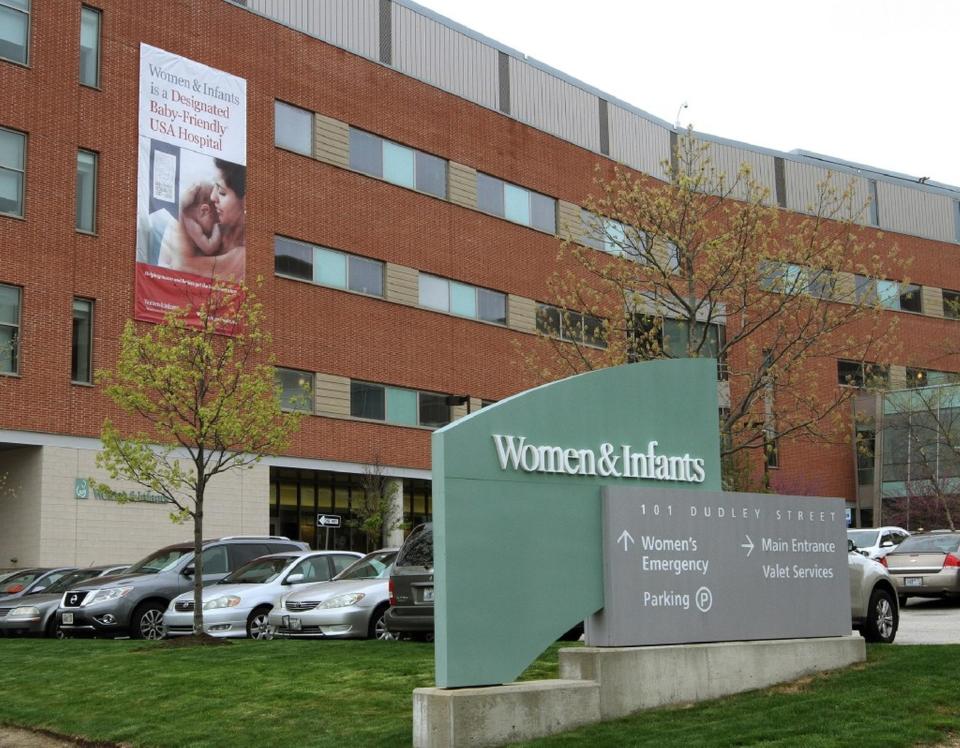
‘It takes a community of compassionate professionals' to help mothers overcome addiction
Erica Oliveira serves as the clinical navigator on the Women & Infants team, a neutral person who helps the mother leverage resources, access treatment and make appointments to increase the odds she’ll succeed. She helps arrange a “warm handoff” so the mother and baby will continue to receive support and services, such as visiting nurses, after they walk out the door.
“It takes a community of compassionate professionals to navigate the system,” Oliveira said. “I’m here to support and advocate for them. I make sure all their questions are answered.”
The unit cares for about 100 families a year, she said, but not all end up taking their little ones home.
“It’s not a small population,” Oliveira said. “My approach is to do everything possible to keep mothers and babies together.”
Often the mothers come with trauma histories and mental health issues, such as depression, anxiety and post-traumatic stress disorder. Oliveira helped care for one woman who'd been trafficked by her own father, and scores more who were prescribed opiates after an injury, only to find their bodies no longer able to function without the drugs.
“If someone needs help, I think we should help them, no matter what their background is,” Oliveira said.
Joziah comes into the world
Sarah Henderson, 36, is one such mom. Gonzalez remembered Henderson from their time on the streets and was on the lookout after receiving word she was pregnant.
After learning she was expecting in May 2021, Henderson, who is diagnosed with major depressive disorder and chronic post-traumatic stress disorder, decided to stop taking Suboxone and Lexapro, fearing she would harm the baby.
She relapsed, theorizing today that in doing so, she was trying to induce a miscarriage.
“I didn’t think I was good enough. I didn’t raise my first one,” said Henderson, whose first child, Greyson, was raised by an aunt.
She tried to get into a treatment program, but some refused because she was pregnant. She reached out to Gonzalez at the Parent Support Network.
“She obviously was looking for me. It really was God-sent. She’s God-sent to me,” Henderson said as she sat with Gonzalez on a spring morning at a Dunkin’ on North Main Street. “If it weren’t for Katie, I think I’d still be using. I have no one. I grew up with no parents.”
Gonzalez helped get her situated at SSTARbirth, a long-term residential substance abuse treatment program designed for pregnant, postpartum and parenting women.
“I came to the realization that God wanted me to have this baby," she said. "I wanted help any way I could get help. I didn’t want my baby suffering anymore.”
She gave birth to Joziah on Dec. 13, 2022, a birth complicated by meconium, when a newborn passes a stool in the womb, and neonatal abstinence syndrome from Henderson managing her recovery with morphine.
“I was such a mess," Henderson said. "I was so afraid he wasn’t going to make it.”
The path to recovery can be fraught
But the path to recovery, and stability, isn't always straight and clear.
Henderson was eventually asked to leave SSTARbirth after a conflict with staff over her belongings. With nowhere to go once again, she faced a threat that DCYF would take Joziah because of her lack of adequate housing. She got onto the state's Coordinated Entry System list for housing, which has an average wait time of 273 days from entry to exit.
“Literally, if you are homeless with a child, there’s nothing you can do,” Gonzalez said of the limited emergency housing options in Rhode Island.
An ex-boyfriend paid for two nights at a hotel before Henderson decided she and Joziah would move in with her mother in Sturbridge, Massachusetts.
“It was that or lose my child," Henderson said. "I had no other option.”
The move was fraught for Henderson, who lived in foster care in Massachusetts from age 8 to 17½ after she said her mother abused her physically and emotionally and drugged her with Benadryl. She was sexually abused by an uncle, she said, which prompted her to allow a family member to raise her oldest child, only to have the same uncle victimize her daughter, who turned him in to the police. (The uncle died of cancer before his trial, she said.)
Her mother, she said, was in active addiction and smoking crack cocaine in the living room when they moved in. She isolated with Joziah in a bedroom but couldn’t make it to recovery meetings because she had no transportation and was displaced from her support network.
“I don’t want to sit in McDonald's all day long,” she said.
Her mother called the police on Henderson in March, reporting that she had been assaulted. She was arrested, she said, for taking too long to remove her belongings from her mother's apartment, and was charged with assault. The Massachusetts Department of Children and Families removed Joziah. A restraining order remains in place, so she has not been able to access their records and medications.
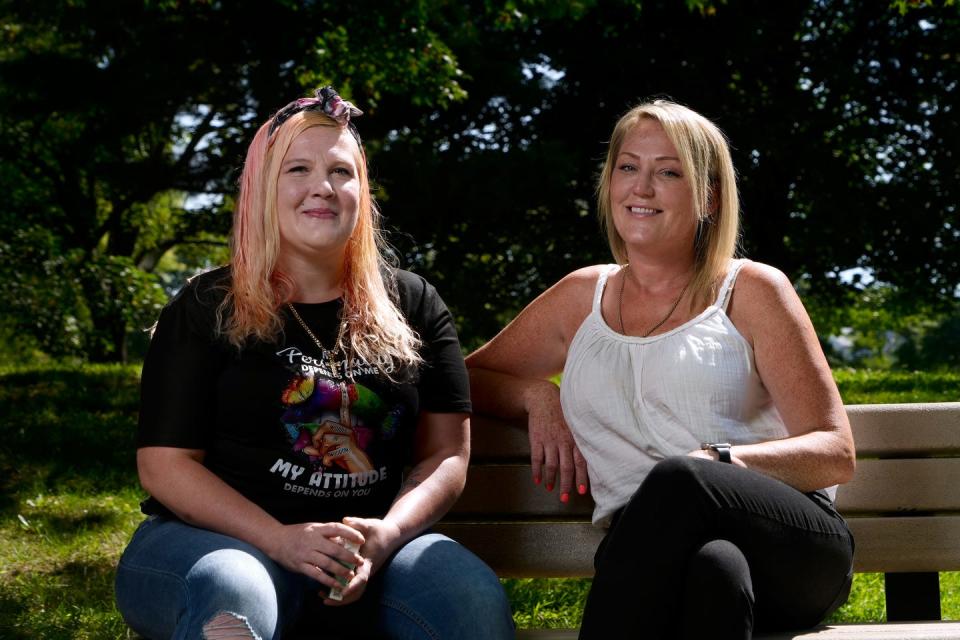
‘I miss him so much. It’s really hard.’
Henderson moved back to Rhode Island and is living in a sober house in Pawtucket and working at Domino’s Pizza. Gonzalez drives her each week to visit Joziah for an hour in Dudley, Massachusetts.
“I miss him so much," Henderson said. "It’s really hard. I’m not going to lie. He’s my inspiration.”
She worries about the baby’s eczema, bringing Aveeno lotion to spread on his head; she relishes when he falls asleep in her arms.
“He has the biggest smile," she said. "He is so excited to see me.”
Gonzalez has continued to drive Henderson to job interviews, accompany her to court dates and treatment, help set her up with parenting classes and try to find her a safe, supportive place to live. Henderson had to forgo training to be a medical transport driver because it would have required her to miss her visits with Joziah.
A Massachusetts caseworker recently told her she should assume she will lose her parental rights to Joziah, she says, a suggestion that makes Gonzalez fume.
Henderson had hoped to participate in Amos House’s Mother-Child Reunification Program, which provides mothers with substance-use issues an opportunity to reunite with their children in safe housing, but she said she was discharged from Amos House’s 90-day recovery-based shelter housing program after an argument.
Mothers Reborn A mother-child reunification program
‘I don’t even shoplift’
There have been other slipups along the way, in keeping with the imperfect path of recovery. She relapsed for two weeks this spring after eight months of sobriety. She lost days to a mix of alcohol and benzodiazepines and was arrested for shoplifting – all while she had $87 in her pocket.
“I don’t even shoplift,” Henderson said.
She contacted Gonzalez after spending two weeks at the Adult Correctional Institutions.
“'If I do this, I’m taking you straight to a program or I’m not doing it,’” Gonzalez recalled warning. “I had to give tough love.”
Still, Gonzalez knows the reality far too well. “I could tell you until I’m blue in the face, but if you’re not ready, you’re not ready," she said. "I know their life would get better, but they’re not there.”
“I was so empty inside. I missed him so much. I still do,” Henderson said. She is trying to get her Family Court case and Joziah returned to Rhode Island, where she has lived for most of her adult life.
Mom finds way to Family Care Unit through SSTARbirth
Tara Lynn DeVoe has delivered two children in the Women & Infants Family Care Unit – StellaRae three years ago and MarleyJane at 3:09 a.m. on May 17. She came to the program through SSTARbirth, as she takes Suboxone and mood stabilizers to manage her alcohol and marijuana habits. She has been sober for six years.
It was a different story with her 5-year-old son, Thomas. DCYF reopened her case after being alerted after his birth that she had used marijuana while pregnant.
"They were threatening to take him," DeVoe recalled. She and Thomas had to move in with her grandmother, and DeVoe soon began spiraling due to the pressure. She started drinking and was asked to leave the home due to safety concerns. Thomas was put in her grandmother's care.
It was during the time away, after the state "stole" her son, she said, that DeVoe found herself pregnant again. The baby's father had a sister who was reuniting with her own child after being admitted to SSTARbirth, and DeVoe wanted to do the same with Thomas.
"That was amazing," DeVoe said. "That's the most stable I've ever been."
Through SSTARbirth, she was introduced to the Family Care Unit, as both StellaRae and MarleyJane were born with neonatal abstinence syndrome that had to be managed with medication.
While StellaRae was born during the pandemic, when visiting time was limited, even for newborn moms, DeVoe got to stay with MarleyJane even after being discharged as they monitored the baby.
More: 'Dark cloud' over District Court: Ex admin alleges coverups, dysfunction and retaliation
"It meant all the world to me that I could stay with her. It's a big thing," DeVoe said.
Oliveira answered all of her questions.
"They weren't judging me. I asked the same questions 60 different ways, 60 different times," she said.
Giving birth to an infant that would likely undergo withdrawal was sad and nerve-racking, but DeVoe was well aware that the alternative would be worse.
"It was beneficial for all of us," said DeVoe, 27, who lives in southern Rhode Island with all three of her children and her boyfriend.
MarleyJane's symptoms were managed with morphine and phenobarbital, but all drugs have recently been weaned from the baby's system. DeVoe takes comfort from StellaRae's experience.
"She's perfect," she says. "She's a whippersnapper."
Gonzalez's story: Drug use, motherhood at 19, and incarceration
The bandwidth, patience and dedication Gonzalez applies to her peer-recovery work draws from her life experience. She was 4 years old when two men with sawed-off shotguns broke into the hotel her mother was managing. She was plagued afterward with nightmares, panic attacks and crushing anxiety that couldn’t be eased until her mother checked every corner.
“I don't think mental health was recognized back then," she said. "If we didn’t talk about it, it never happened.”
As a teenager growing up in Wrentham, Massachusetts, she tried smoking pot and by 18 had tried cocaine. She gave birth to her son, Kyle, at 19 and was sober for a spell before returning to the clubs on the weekends.
“With me, I didn’t have an off switch. I was too embarrassed and anxious to walk across a restaurant,” she said.
A boyfriend introduced her to OxyContin at 24. “That was the one thing that truly made me feel comfortable. It was comforting,” Gonzalez said. “In my mind, it was different because it comes from a doctor.”
A doctor prescribed a friend “a disgusting amount” of OxyContin and Percocet, and they graduated from partying on weekends to partying on Wednesdays until it became all consuming. Soon, she was spending her lunch breaks at work seeking out drugs to avoid getting “day sick.” The rent went unpaid.
“Not being sick came first,” Gonzalez said.
After the pills dried up, Gonzalez tried heroin to get her fix, eventually injecting it.
“My brain every day was about finding money to get more," she said. "It hijacks brains.”
Her mother told her to leave the house and go to rehab. She began getting arrested for credit card fraud and found herself at the Adult Correctional Institutions.
Enough is enough: 'Is this what my life has become?'
Gonzalez had three cases open when she agreed to go to drug court before Superior Court Magistrate John J. Flynn. She kept failing drug screens and ran from the courthouse before an appearance.
“I was thinking it was easier to go to jail for a year,” Gonzalez said. “I thought, 'Holy [expletive], is this what my life has become?’”
Gonzalez, who by this time had been brought back from an overdose by Narcan three times, had herself admitted to the residential detox program at Butler Hospital and later turned herself in to the courts. She relapsed after six months and once again found herself sitting on a sidewalk.
“I said, 'I’m done. I’m not doing this anymore,’” she recalled.
R.I. Drug Court: Instead of jail, recovery for addicts
Her mother, who safely cared for her son all the while, drove her to intensive outpatient treatment every day.
Gonzalez met her husband, Carlos, whose drug of choice was cocaine, while living in a sober house. Soon after, she learned she was pregnant.
“We made it work,” she said.
She got her peer recovery certification through Anchor Recovery Center and was advised to get on methadone.
“I feel like I was able to finally stop using because of methadone,” she said.
Wracked by guilt over using methadone while pregnant
While Gonzalez credits methadone as the key to keeping her sober, she felt judged at the clinic by fellow drug users and experienced being treated with disdain by some health care providers. Even her husband didn’t understand, she said.
“There is such a stigma to being on methadone while pregnant,” she said. She was gripped by guilt over taking medication while carrying the baby, knowing that the newborn would likely undergo withdrawal after the umbilical cord was cut.
But suddenly stopping the medication subjects the fetus to stress and withdrawal in utero and heightens the risk the mother will resume misusing opioids, according to medical providers.
“It’s so dangerous. What if I stop and then I relapse?” she said. “There are so many reasons not to get off it.”
Henderson, who developed an addiction to opiates at 18 after being prescribed Percocet and morphine for back pain, experienced similar stigmatization from a doctor at Roger Williams Medical Center.
“They look at you like you’re so disgusting,” Henderson said.
Shame and stigma are barriers to seeking treatment
That shame and stigma can keep pregnant mothers who are using drugs underground and unwilling to seek help and treatment. Compounding that is the fear the authorities might take their newborn away. In other words, they won’t be willing to pick up that call offering assistance.
A study published in May in the Maternal and Child Health Journal found that states like Massachusetts that require automatic filing of child abuse and neglect for substance-exposed newborns, including infants exposed in the womb to prescribed medications to treat opioid use disorder, proved to be harmful and a barrier to women seeking medical treatment. The study said separating treatment decisions during pregnancy from mandated reporting at birth was essential.
Katz observed that changes in Rhode Island’s approach to medication-assisted treatment during pregnancy came at a time when the opioid crisis was increasingly affecting middle-class white people. She contrasted it with the treatment of Black mothers during the crack cocaine epidemic.
“It speaks to inequity in the system and racism,” Katz said. “It’s a real interest of my program [for patients] to receive bias-free care.”
Coyle agreed. “In Rhode Island we try very hard to respect the patient,” she said.
Coyle emphasized, too, that the so-called "fourth trimester" is a particularly vulnerable and potentially deadly time for new mothers with opioid-use disorder. They are dealing with the stress of caring for a newborn while managing their own recovery.
“It’s a time we really need to be checking in on these moms,” she said.
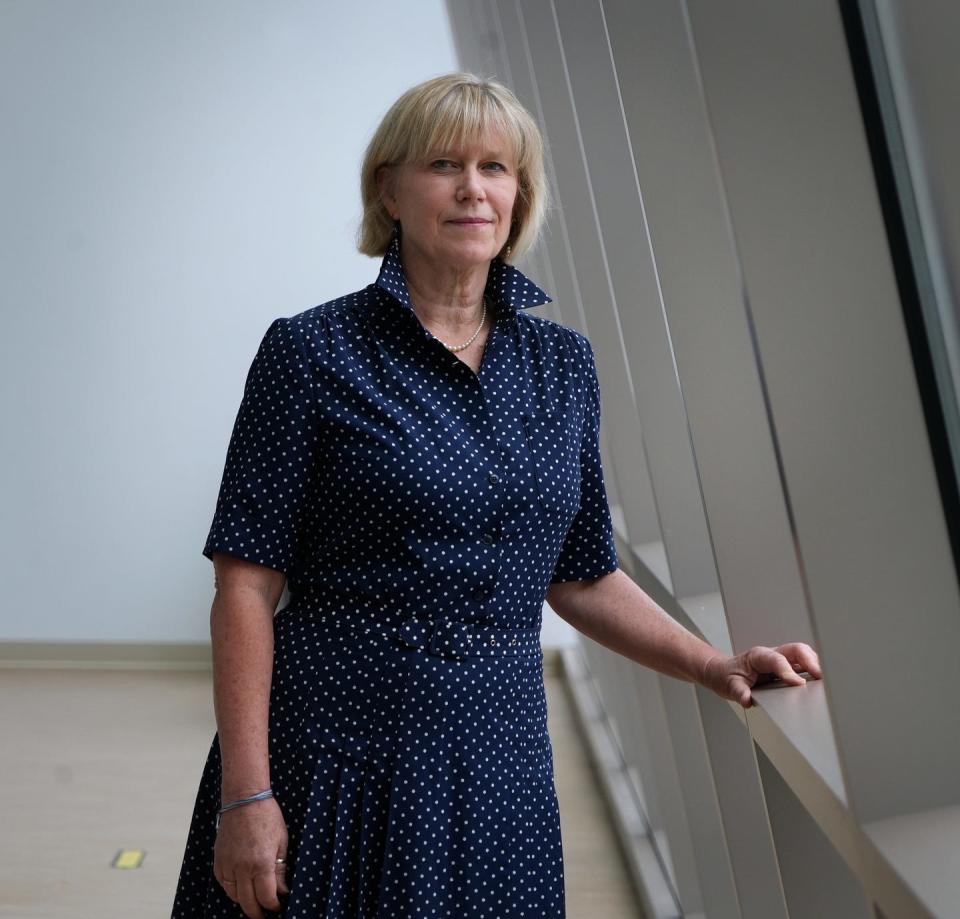
Also in 2019, DCYF shifted from a solely incident-based investigative process to a more comprehensive assessment of families’ strengths, behaviors and functioning, Terry said. The SAFE (Safety Assessment through Family Engagement) Practice Model empowers caseworkers to work with parents to create plans that address behavioral changes to maintain child safety, permanency and well-being.
“Somebody may have a bad day, and they don’t look like that every day,” Terry said. It provides room for a relapse, as long as there are safety measures in place, such as another caretaker in the home.
Gonzalez's unwavering support is the 'secret sauce'
On any given day, Gonzalez is helping up to 15 mothers, including Henderson. It’s a remarkable feat, given the gravity of the hurdles Henderson is facing.
“To have someone like Katie who’s walked the walk. Katie is really the secret sauce,” Katz said.
“I just remember how I felt when I was that mom,” Gonzalez said. She assures her now 21-year-old son that her missing out sometimes when he was young was never a reflection of a lack of love.
She wants to see the same for Henderson, who has reconnected with her 17-year-old daughter, Greyson, and dreams one day that they will all be together with Joziah.
“She’s going to break her family’s cycle,” Gonzalez says.
The role Gonzalez plays in Henderson’s life cannot be overstated.
“She’s like a wicked inspiration," Henderson said. "I see how far she’s come, and that gives me hope.”
Gonzalez openly communicates with 21-year-old Kyle, 6-year-old Alani and her stepson, 8-year-old Mason. She takes strength from learning in a class exploring drugs and human behavior that, while the children might inherit their parents’ proclivity for addiction, they will also absorb their resilience, a message she relays to Henderson and the other mothers.
She sees that resilience and strength reflected in Henderson, who has endured and overcome so much in her life.
“I’m working with them, not judging them. I let them know that someone believes in them and to just be the best versions of themselves,” she said.
Gonzalez savors, too, that she now leads the “most simplest boring life” and takes her joy from gardening at the home she and her husband bought in 2022.
“I get to share the worst parts of life openly and honestly. You can’t do that in any other career,” she said. “All those crappy experiences helped shape who I am today.”
She wants the same for Henderson and all the other parents: “I want to reach these pregnant women before they come through on a hotline call.”
This article originally appeared on The Providence Journal: Keeping families intact: How RI helps pregnant mothers with substance use

